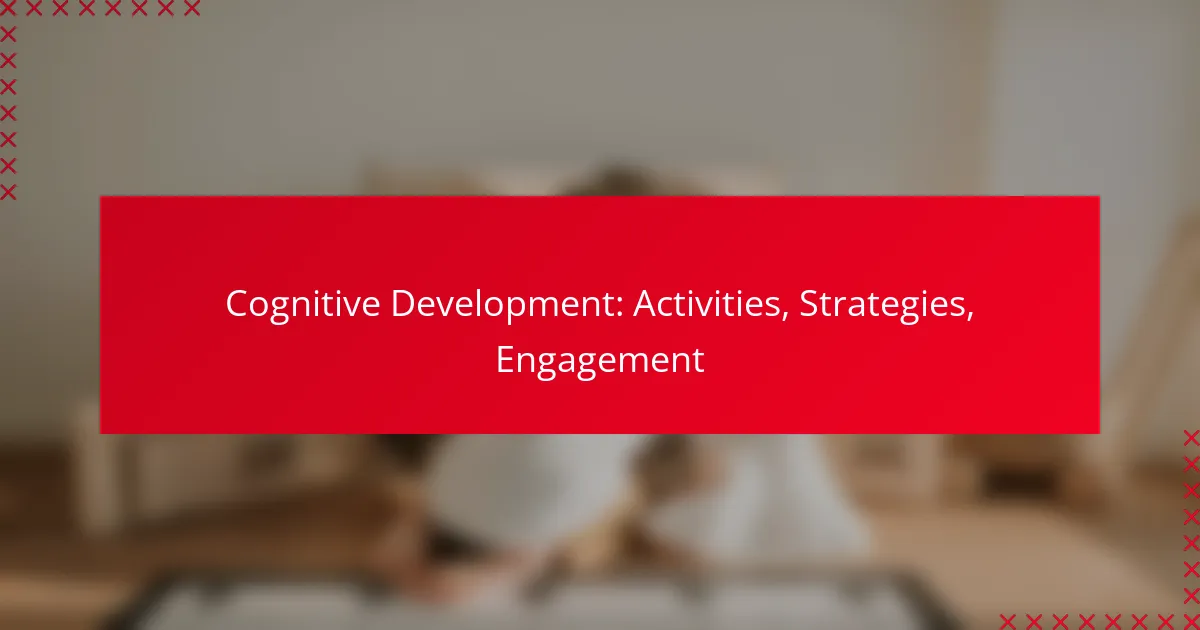Cognitive development in children is crucial for their overall growth and can be significantly enhanced through engaging activities such as interactive play, problem-solving games, and creative arts. Parents play a vital role by implementing strategies that encourage critical thinking and creativity, creating an enriching environment that supports learning. By fostering a balance of structured routines and open-ended exploration, caregivers can effectively stimulate children’s cognitive skills and prepare them for future challenges.
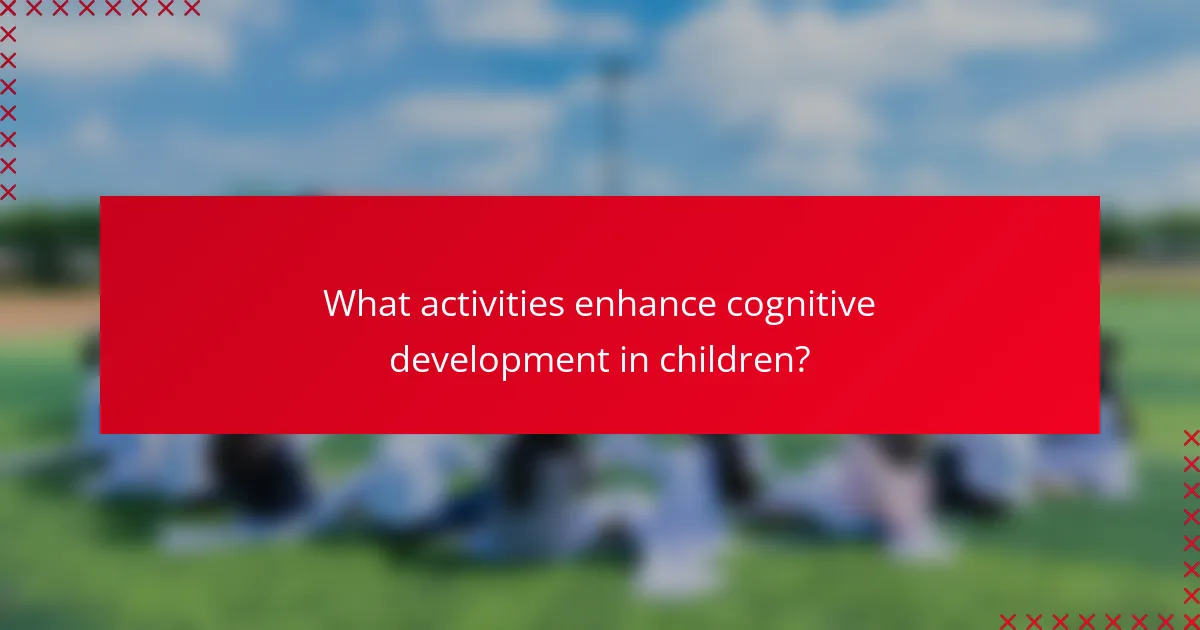
What activities enhance cognitive development in children?
Activities that enhance cognitive development in children include interactive play, problem-solving games, creative arts, reading, and outdoor exploration. These activities stimulate critical thinking, creativity, and social skills, which are essential for overall cognitive growth.
Interactive play
Interactive play involves engaging children in games that require communication and cooperation. Activities like role-playing or team sports encourage social interaction and help develop language skills and emotional intelligence.
Consider incorporating games that require turn-taking or collaborative problem-solving. Simple board games or group activities can enhance these skills while making learning enjoyable.
Problem-solving games
Problem-solving games challenge children to think critically and develop strategies. Puzzles, logic games, and math challenges encourage analytical thinking and perseverance.
Choose age-appropriate games that gradually increase in difficulty. This can keep children motivated and help them build confidence as they tackle more complex problems.
Creative arts and crafts
Creative arts and crafts allow children to express themselves while enhancing fine motor skills and cognitive flexibility. Activities such as drawing, painting, or building with blocks stimulate imagination and creativity.
Provide a variety of materials and encourage open-ended projects. This fosters innovation and allows children to explore different techniques and ideas without the pressure of a specific outcome.
Reading and storytelling
Reading and storytelling are crucial for language development and comprehension skills. Engaging with books helps children expand their vocabulary and understand narrative structures.
Incorporate a mix of fiction and non-fiction to broaden their knowledge base. Discussing stories and asking questions can further enhance critical thinking and comprehension.
Outdoor exploration
Outdoor exploration encourages children to interact with their environment, promoting curiosity and observational skills. Activities like nature walks, gardening, or scavenger hunts can spark interest in science and the natural world.
Encourage children to ask questions about their surroundings and discover answers through exploration. This hands-on approach to learning fosters a sense of wonder and enhances cognitive development.
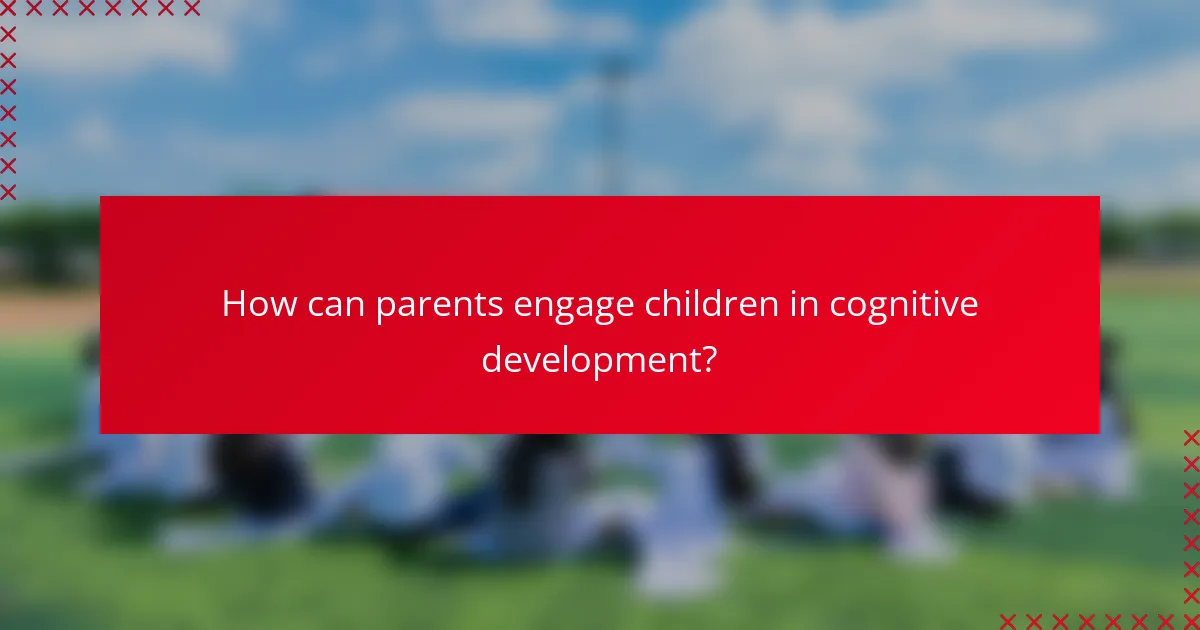
How can parents engage children in cognitive development?
Parents can actively engage children in cognitive development through various strategies that stimulate thinking, problem-solving, and creativity. By incorporating structured routines, asking open-ended questions, facilitating collaborative projects, and limiting screen time, parents can create an enriching environment that fosters learning and growth.
Structured routines
Structured routines provide children with a sense of security and predictability, which can enhance their cognitive development. Establishing consistent daily schedules for activities such as homework, play, and meals helps children understand time management and develop self-discipline.
To create effective routines, consider using visual schedules or charts that outline daily tasks. This approach not only helps children anticipate what comes next but also encourages them to take responsibility for their own activities.
Open-ended questions
Asking open-ended questions encourages children to think critically and express their thoughts creatively. Instead of questions that require a simple yes or no answer, parents can ask questions like, “What do you think would happen if…?” or “How would you solve this problem?”
These types of questions promote discussion and allow children to explore different perspectives. Parents should listen actively and provide feedback to further stimulate their child’s thinking process.
Collaborative projects
Engaging children in collaborative projects fosters teamwork and enhances cognitive skills through shared problem-solving. Activities like building a model, creating art, or working on a science experiment together can help children learn from one another while developing critical thinking and communication skills.
When planning collaborative projects, choose tasks that align with your child’s interests and abilities. This ensures that they remain engaged and motivated throughout the process.
Limit screen time
Limiting screen time is essential for promoting cognitive development, as excessive use of devices can hinder critical thinking and creativity. The American Academy of Pediatrics recommends that children aged 2 to 5 have no more than one hour of high-quality programming per day, while younger children should have minimal screen exposure.
Encourage alternative activities such as reading, outdoor play, or hands-on learning experiences. Setting clear boundaries around screen use can help children develop healthier habits and engage more fully in cognitive development activities.
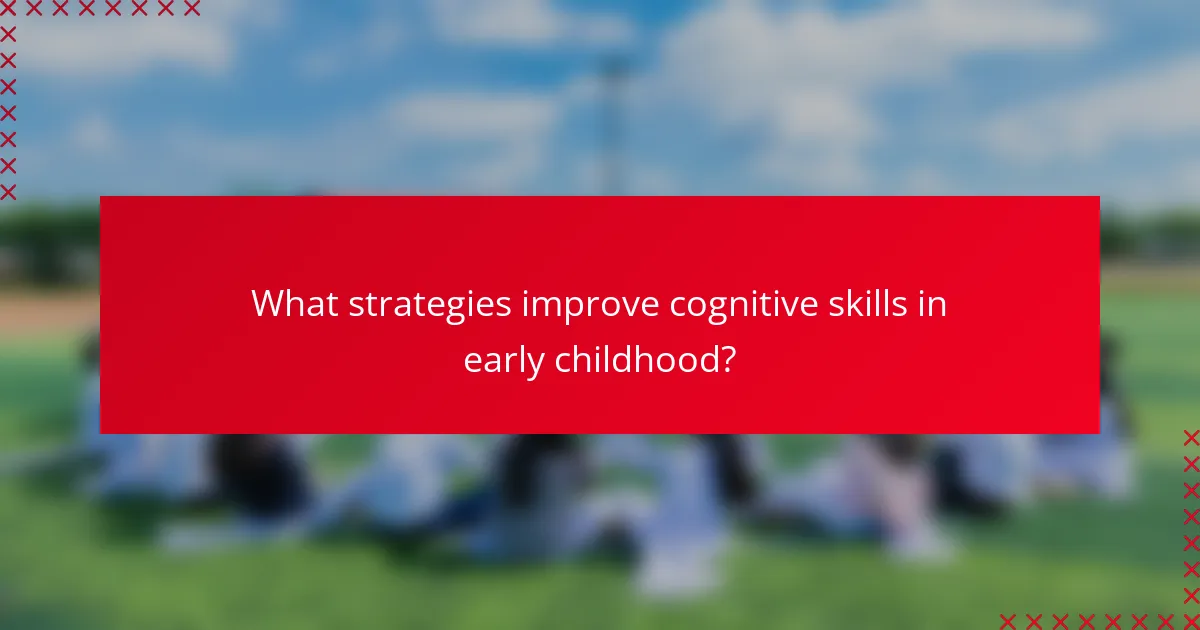
What strategies improve cognitive skills in early childhood?
Strategies that enhance cognitive skills in early childhood include engaging children in activities that stimulate their thinking, memory, and language abilities. These methods foster critical thinking, problem-solving, and communication skills, laying a strong foundation for future learning.
Mindfulness exercises
Mindfulness exercises help children develop focus and emotional regulation, which are essential for cognitive growth. Simple practices like deep breathing, guided imagery, or short meditation sessions can be integrated into daily routines.
To implement mindfulness, set aside a few minutes each day for these activities. Encourage children to pay attention to their thoughts and feelings without judgment, which can improve their concentration and reduce anxiety.
Memory games
Memory games are effective tools for enhancing memory and attention in young children. Activities like matching cards, Simon Says, or simple recall games can be both fun and educational.
Start with short sessions, gradually increasing complexity as children improve. Aim for games that require them to remember sequences or patterns, which can significantly boost their cognitive skills.
Language enrichment activities
Language enrichment activities foster vocabulary development and communication skills. Reading aloud, storytelling, and engaging in conversations about various topics are excellent ways to enhance language skills.
Incorporate diverse materials such as books, songs, and rhymes to keep children engaged. Encourage them to express their thoughts and ask questions, which promotes critical thinking and language proficiency.

What are the benefits of cognitive development activities?
Cognitive development activities enhance mental processes such as thinking, learning, and problem-solving. Engaging in these activities can lead to significant improvements in various cognitive skills, ultimately benefiting individuals in their daily lives.
Improved problem-solving skills
Participating in cognitive development activities fosters better problem-solving abilities. These activities often present challenges that require critical thinking and creativity, encouraging individuals to explore multiple solutions.
For example, puzzles and strategy games can enhance logical reasoning and analytical skills. Incorporating these activities into daily routines can lead to a noticeable improvement in how individuals approach and resolve real-life problems.
Enhanced memory retention
Cognitive development activities can significantly boost memory retention. Engaging in tasks that require memorization, such as learning new languages or playing memory games, helps strengthen neural connections associated with memory.
Techniques like spaced repetition and mnemonic devices can further enhance memory retention. Regular practice of these methods can lead to improved recall and a deeper understanding of information.
Better social interactions
Engaging in cognitive development activities often leads to improved social interactions. Activities that involve teamwork, such as group games or collaborative projects, help individuals develop communication and interpersonal skills.
These interactions can enhance emotional intelligence, making it easier to understand and respond to social cues. As a result, individuals may find themselves more adept at forming and maintaining relationships, both personally and professionally.
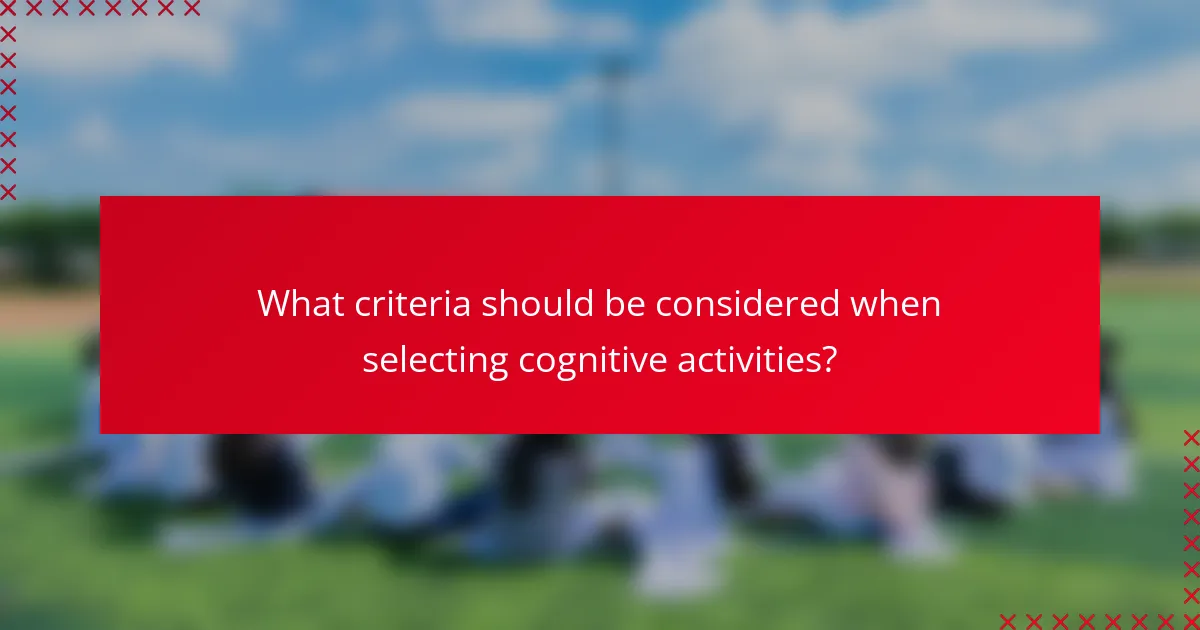
What criteria should be considered when selecting cognitive activities?
When selecting cognitive activities, consider factors such as age appropriateness, developmental goals, and engagement levels. These criteria ensure that activities are suitable and beneficial for the individual’s cognitive growth.
Age appropriateness
Age appropriateness is crucial for selecting cognitive activities that match a child’s developmental stage. Activities should challenge the child without causing frustration or disengagement. For instance, toddlers may benefit from simple puzzles, while school-aged children can handle more complex problem-solving tasks.
To determine age-appropriate activities, refer to developmental milestones and guidelines. For example, activities for preschoolers often focus on basic counting and shape recognition, while activities for older children may include memory games and critical thinking exercises.
Always consider the individual child’s interests and abilities. Engaging activities that align with their preferences will foster a love for learning and enhance cognitive development. Avoid pushing children into activities that are too advanced, as this can lead to negative experiences and reduced motivation.
